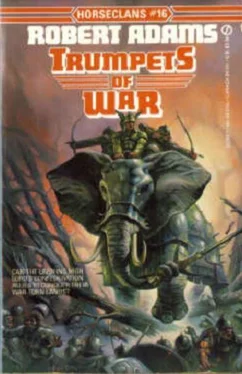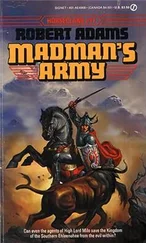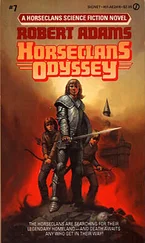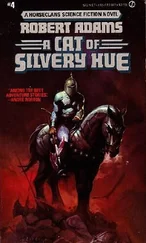After the third or the fourth time he slipped and stumbled on the broken, uneven footing, his boots not having been designed for ease of walking anyway, Gil found himself steadied and easily lifted back onto his feet by the powerful but infinitely gentle trunk of Sunshine.
“I will say it once more,” came her strong mindspeak, “you are silly to try to walk, man-Gil. Why your poor little feet will be sore beyond bearing by sunset.
Those men yonder are all astride their own small, skinny-legged beasts, so why do you three not ride Sunshine and her sisters, brother?”
Gil sighed. Sunshine could be as stubborn as any hardheaded mule when she chose to so be. He beamed in reply, “It is still as I have said ere this, sister-mine: high as you are, if I should take my place upon your neck, anyone watching from the other army will then know that at least one elephant is in this area, and it is the plan of the Grand Strahteegos Komees Pahvlos that they gain no knowledge of just where we are until the time comes for us to attack them. Please try to understand this time, dear sister.”
“Silly, silly, silly!” Sunshine mindspoke disparagingly. “Two-legs are surely the very silliest of any living creatures! Fighting is surely the silliest of all two-leg pastimes, and Sunshine is herself silly for deigning to take any part in such ultimate sillinesses ... she only does so because it makes her brother happy and she dearly loves him, man-Gil.”
Even as man and elephant communicated, seven huge long-toothed felines were but just arrived stealthily in position a short distance behind the cavalry reserve of the bandit army. They crouched, unmoving as so many statues, only the respiration movements of their sleek, wiry bodies denoting that life resided in them. In a tiny copse they lurked, the agouti bodies blending well with the dead leaves that here thickly littered the ground.
One of the prairiecats—for such they all were, having come as part of the Horseclans force—meshed his mind with those of two others of his kind to gain sufficient mental projection for farspeak and then beamed out, “We are where we were told we should be, Chief Pawl. The horses cannot smell us. Not yet, but if the wind should shift . . . ? If they do smell us before you want them to, Chief Pawl, will we still get to fight? It has been so long since we were allowed to fight.” There was a wistful note to the last comment.
Pahvlos found it necessary, at the onset, to alter his carefully laid-out and planned battle line. With the bandit army forming up into position some hundreds of yards distant in clear sight on the verdant plain that lay between his camp and the walls of Kahlkopolis, it was become painfully obvious that was his center to not be overlapped by the more numerous enemy center, he must either stretch his lines of armored pikemen to a thinness that would be patently suicidal or he must commit to the battle line the unarmored pikemen of Captain Ahzprinos, and for the umpteenth time he foully cursed the old-fashioned, obstinate, obtuse officer and his stubborn failure to emulate the Freefighter regiment as had Captain Bizahros.
At length, the Grand Strahteegos made what he felt to be the very best of a singularly bad situation. He grudgingly extended the fronts of Captains Hehluh and Bizahros in a depth of only four pikemen, then he took the two battalions of the unarmored men from off the wings, rejoined them with their reserve regiment and used them to back the armored pikemen all along the battle line. He realized that there still would be some slight overlap, but it was the best he could do under the circumstances.
Of course, these rearrangements left him damnall reserve—one battalion of the old-style pikemen, the engineers, pioneers and artificiers who could be thrown in in a real emergency, the headquarters guard of heavy horse and a scattering of lancers—but it would just have to do.
Nor was he formed back up any too soon, for out from behind the battle line of the bandit army came the war-carts, moving at a slow walk until clear of their own men, then gradually increasing the pace of their big, barded draught mules to a fast canter. As soon as they were safely away, the entire enemy line began to advance, in formation, at a walk, their shouldered pikes standing high above them like some long, narrow forest of wind-slanted saplings, the silvery points all aglitter in the sun. Their form of advance told him exactly how the oncoming war-carts would be used, at least in the opening segment of this battle. He sent a galloper to the captain of engineers notifying him of the walking advance, that he might reset the torsions and tensions of his engines for the shorter range.
Only a mere two of the oncoming war-carts were struck by the volley of stones and spears hurled by the engines before they were reset, but even this was remarkable and lucky in the extreme, considering that the targets were moving quite fast and could not be seen by the men who loosed off the engines. Pahvlos had been told that Captain of Engineers Teemos was the best of the best and that he numbered among his company some real artists at the tricky skills of handling light engines; now the old strahteegos believed it, every word of it.
Barded to the fetlocks as the mules were, there was no way for Pahvlos to determine just how heavily or fully the draught mules werearmored, it was only safe to assume that they were. Between six and eight men stood in the bed of each jouncing, springless cart, mixed archers and dartmen from the looks of them; on the two nearside mules, fully armored men with sabers or axes were mounted, so none of the missile-men need worry about guiding the mules. He noted that the carts consistently kept a goodly distance one from the other, lest the long, cursive steel blades projecting from the wheel hubs become entangled with another set or, even worse, cripple a mule.
Even if the slow advance of the enemy infantry lines had not told him, Pahvlos would have known as soon as he saw just how few of the armor-plated war-carts there were that they were too few to tempt even such an amateur strahteegos as the bandit chief Mainahkos to send them head on at a hard gallop against the massed pikes and hope to get more than a mere handful of them back, for anyone with a grain of sense would realize that the cavalry in the rear areas could ride rings around such relatively slow, cumbersome conveyances, deadly rings, in the case of the horse-archers that the bandits knew he owned as a part of his army.
That left only a couple of alternative uses for the archaic carts. One of these would be an attempt to drive between wings and center and thus take the pike lines on the more vulnerable flanks; the other would be to make a series of passes across the front while raining the pikemen with arrows and darts.
It was to be the latter choice, Pahvlos saw. In staggered lines, the war-carts were drawn, clattering and bouncing over the uneven ground, the full length of the formations of pikemen, expending a quantity of arrows and darts for precious few casualties against the armored front ranks. As the leading war-carts reached the end of that initial pass, however, and began to wheel about, they received an unexpected and very sharp taste of similar medicine to that which they had been seeking to so lavishly dispense to the static lines of infantry. Captain Chief Pawl Vawn of Vawn, commanding the left wing, treated the carts and their mules and postillions to such a pointblank arrow storm that nearly a dozen were put out of action then and there. Nor did the hapless crews of the carts receive any less from the half-squadron of Horseclansmen under one of Captain Pawl’s sub-chiefs, on the other wing, which eliminated more of their number, almost halving the fifty that had set out to begin.
With it patent that the war-carts were doing no significant damage to his front, Pahvlos dispatched a galloper to carry his order to Captain Thoheeks Portos and his heavy cavalry. Out from the rear area they came, taking a wide swing around the right of their own lines to end in delivering a crushing charge against the mixed heavy and light horse on the left wing of the bandits’ battle line. That charge thudded home with a racket that could be heard by every man on the field and even in the camp and the city, walls or no walls.
Читать дальше












